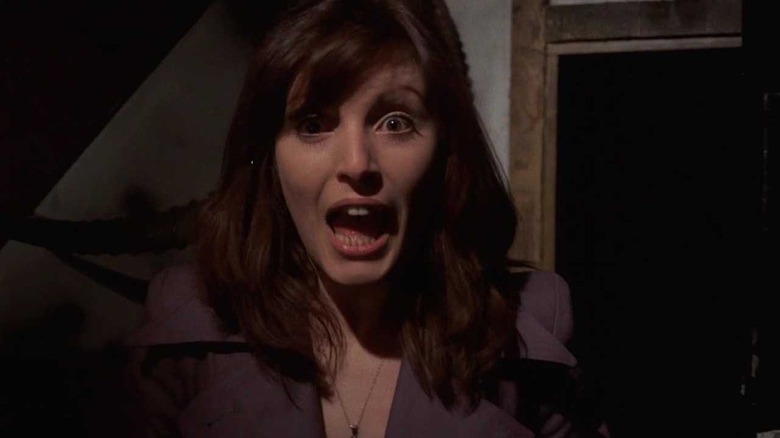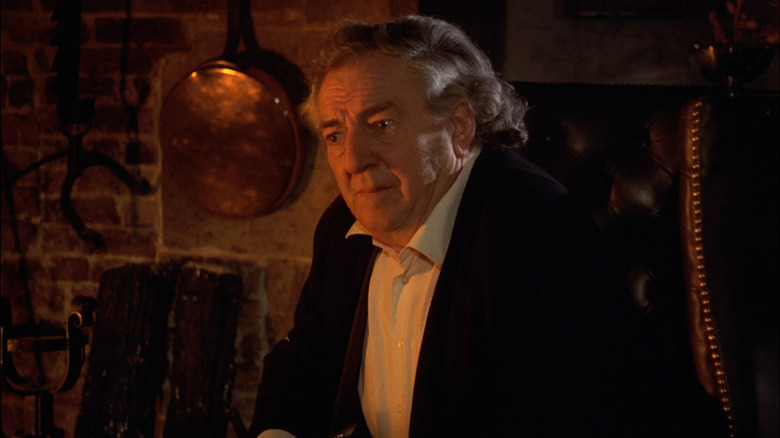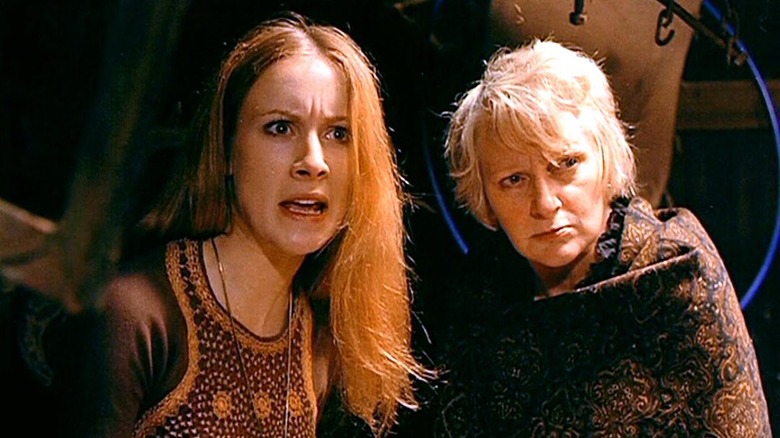Frightmare Is The Forgotten '70s Cannibal Slasher You Need On Your Movie Menu
There is a particular grime and abject cruelty to 1970s British horror that sets it apart from the decade's American gorefests (which reflected the damaged psyche of a country mired in a mindlessly bloody war). They're closer in tone to Italian splatter, but lack the grisly, absurdly protracted set pieces favored by Lucio Fulci and Umberto Lenzi. They're just mean. Whether this was a bitter reaction to the end of the empire, a creeping dread induced by the approach of the conservative Thatcher era, or a melange of these factors and more is something I'll leave to folks with a firmer grasp of British history than I possess. I just know that these movies are deeply pissed off about something, and tend to take this fury out on innocent characters. Even Alfred Hitchcock got into the act with his deliciously evil "Frenzy."
One of this era's most unapologetically vicious filmmakers was Pete Walker. The son of a stand-up comic and a showgirl, Walker infused his horror flicks with a bawdy sensuality that was likely cribbed from his mother's profession. Movies like "Die Screaming, Marianne" (an early hit for sex symbol Susan George) and "House of Whipcord" repulse and titillate in equal measure. They know why you plunked down your cash, and they make you pay dearly for your leering curiosity.
They're also, despite their budgetary limitations, shockingly well made. Walker, who knocked out 13 movies in 10 years, brought a cleanly composed sense of style to his rough provocations. Images stay with you long after you've forgotten the intricacies of the plot. And he was never in greater command of his sleazy aesthetic than when he unleashed the irresistibly rancid "Frightmare."
A densely plotted (and often just plain dense) tale of terror
First, a bit of housekeeping. This is not the 1981 "Frightmare," a silly slasher about a resurrected horror movie star who literally explodes from the grave and goes on a co-ed killing rampage. That movie has its low-rent charms, but it's nowhere near as audacious as Walker's film.
"Frightmare" '74 opens with a husband and wife, Edmund and Dorothy Yates (Rupert Davies and Sheila Keith), being sentenced to a mental institution for unspecified human atrocities. If they can demonstrate to the authorities that they have mended their wicked ways, they will be eligible for release.
The film then jumps forward to the present day, where it clunkily sets up its convoluted plot. Edmund and Dorothy have inexplicably earned their release, and now live in the countryside where they are visited by Jackie (Deborah Fairfax), Edmund's daughter from a previous marriage. Jackie seems relatively with-in, though her life is complicated by her troublemaking 15-year-old step-sister, Debbie (Kim Butcher), who carouses into the wee hours with a hell-raising biker gang. They're a tough lot, but Debbie's got a disturbing penchant for hurtling them into violent conflict. In one instance, she lies about a run-in with a bartender which results in the poor guy getting tuned up with a steel chain.
Debbie's a bad seed, and it soon becomes apparent that she's every twisted inch her mother's child. But does she also possess her mom's taste for human flesh?
The family that consumes human flesh together...
I love a good mess on occasion, and, narratively, "Frightmare" is amusingly all over the place. It's a cannibal shocker, a proto-slasher, a family drama and a deeply silly psychological thriller. Unsurprisingly, it's at its best when people are having their eyes plucked out or getting run through with a flaming hot fireplace poker. But these brutal flourishes stain the brain because the performances, especially those of Davies and Keith, are first rate. Keith was a Walker regular and she revels in Dorothy's cartoon savagery. Davies' Edmund is a too-dutiful husband whose unconditional love for Dorothy compels him to support her flesh-devouring habit. His motivations are hazy; he loves Jackie, and desperately wants for Dorothy's mental well-being. Ultimately, he has to make a choice between the two, and that's where Walker ends the movie (with a fairly gnarly freeze-frame).
This is, finally, a terrifying yarn about blended families, one that Walker might've been able to pull into tighter focus had he not been such a grinder. Dorothy's cannibal predilection gets briefly explained, but it's too pat to give Keith anything more to play than a sadistic monster — which, for a film this ludicrous, is fine! Walker was an exploitation filmmaker (he's still with us, though he retired from directing in 1983) who lived for the jolt. "Frightmare" certainly delivers on this level, though you may hate yourself for enjoying its mean-spiritedness as much as you do.


